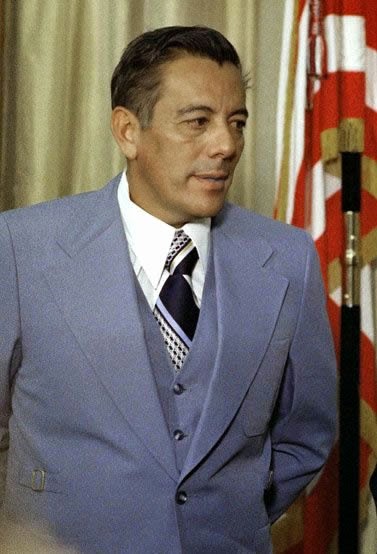 |
| General Omar Torrijos Herrera |
General Omar Efraín Torrijos Herrera was the de facto ruler of Panama from his coup d’état of 1968 until his death in an airplane crash on July 31, 1981, after which he was succeeded by General Manuel Noriega.
Best known for successfully negotiating a series of treaties in 1977 with the United States for the return of the Panama Canal to Panama in 2000, Torrijos (torr-EE-yos) was a staunch U.S. ally who instituted a range of popular reforms while also suppressing dissent and committing many human rights abuses during his years as the country’s supreme military ruler.
Never elected to office, Torrijos dominated Panama’s political life for 13 years, his rule representing a significant departure from the country’s previous regimes, dominated by the country’s traditional landowning and commercial elite concentrated in Panama City.
 |
Denounced by many as a false populist whose dictatorship ruthlessly crushed dissent, paid lip service to anti-imperialism, and selectively dispensed government patronage to defuse and coopt opposition, Torrijos was born on February 13, 1929, in the town of Santiago, southwest of Panama City.
In 1952 he joined the U.S.-created National Guard, was promoted to captain in 1956, and attended the U.S.-run School of the Americas. As a lieutenant colonel, in 1968 he and Major Boris Martínez overthrew the democratically elected president Arnulfo Arías.
Torrijos cultivated the political support of the urban and rural poor, the working class, the middle class, and students through government largesse, legal reforms, and the populist, nationalist, anti-imperialist rhetoric espoused by his People’s Party (Partido del Pueblo, or PdP).
 |
| in 1978 President Jimmy Carter and Panamanian leader Omar Torrijos exchanged the instruments of ratification for the Panama Canal treaties. |
Leaving existing property relations largely intact, he excluded the country’s traditional powerholders from office, dissolving the national legislature and outlawing other political parties.
The high point of his rule came in the 1977 treaties with the United States, though his expenditure of political capital in securing the treaties’ passage compelled him to approve amendments to the constitution in 1978 that paved the way for a return to civilian rule. The circumstances of his death remain the topic of considerable controversy, with some implicating his successor, Manuel Noriega, in the plane crash that killed him in 1981.


